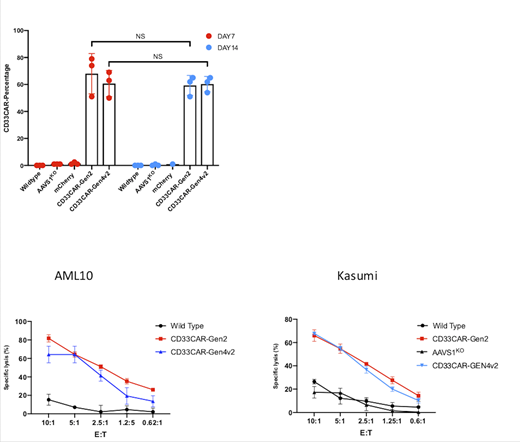Human peripheral blood natural killer (NK) cells have intense antitumor activity and have been used successfully in several clinical trials. Modifying NK cells with a chimeric antigen receptor (CAR) can improve their targeting and increase specificity. Recently, we described an efficient method for gene targeting in NK cells using Cas9/ribonucleoprotein complexes (PMID: 29985369 and 32603414). Here we combined this approach with single-stranded (ss) or self-complementary (sc) Adeno-associated virus (AAV)-mediated gene delivery for gene insertion into a safe-harbor locus using a wide variety of homology arms for homology repair (HR) and non-homologous directed CRISPR-assisted insertion tagging (CRISPaint) approaches. We demonstrated that expansion of NK cells on feeder cells (CSTX002) expressing membrane-bound IL21 increases expression of HDR-related genes and provides optimum biological condition for targeted gene insertion. For proof-of-concept, we successfully generated stable mCherry-expressing primary NK cells (up to 89% mCherry+) and determined that sc vectors with 300bp homology arms were optimal. Then, we generated CD33-targeting CAR NK cells with differing transmembrane and signaling domains (CD4/4-1BB+CD3ζ and NKG2D/2B4+CD3ζ), which continued to show robust expansion on CSTX002 and stably maintained their CAR expression. This resulted in CAR-NK-cells of high number and purity (mean 68% CAR+) that demonstrated enhanced antileukemic activity against acute myeloid leukemia (AML) cell lines. This efficient method for site-directed insertion of genetic materials into primary NK cells has broad potential for fundamental discovery and therapeutic applications.
Keywords: CRISPR, NK, Cas9/RNP, AAV6, CRISPaint, HR, CD33CAR-NK
Naeimi Kararoudi:Kiadis Pharma Netherlans B.V: Patents & Royalties. Lee:Kiadis Pharma Netherlands B.V: Consultancy, Current equity holder in publicly-traded company, Membership on an entity's Board of Directors or advisory committees, Patents & Royalties.
Author notes
Asterisk with author names denotes non-ASH members.


This feature is available to Subscribers Only
Sign In or Create an Account Close Modal